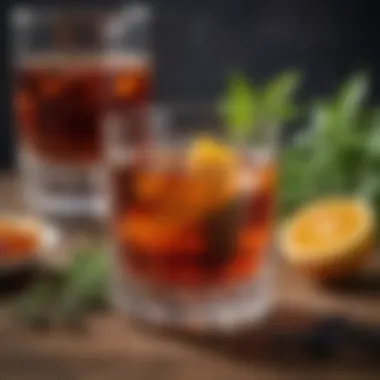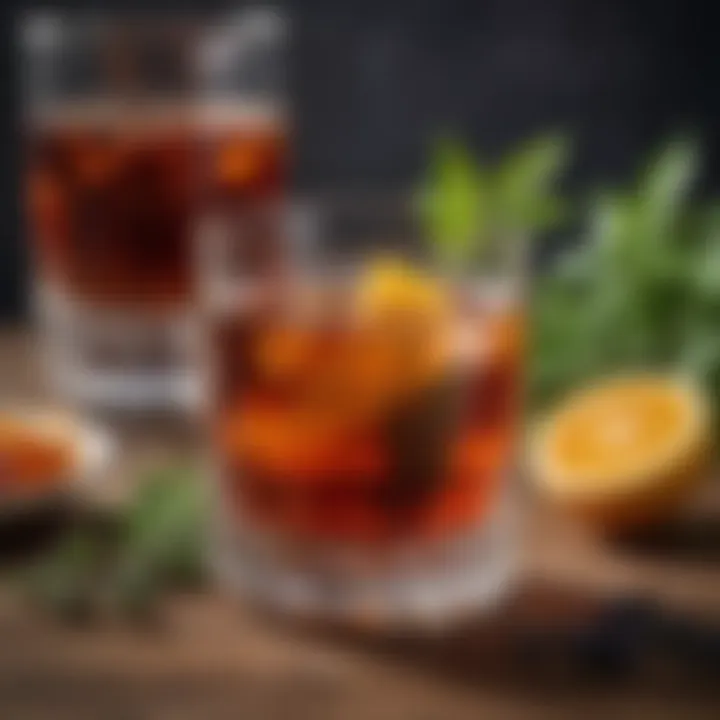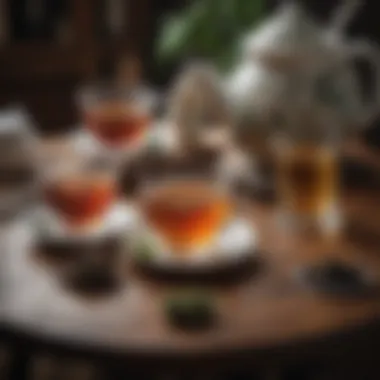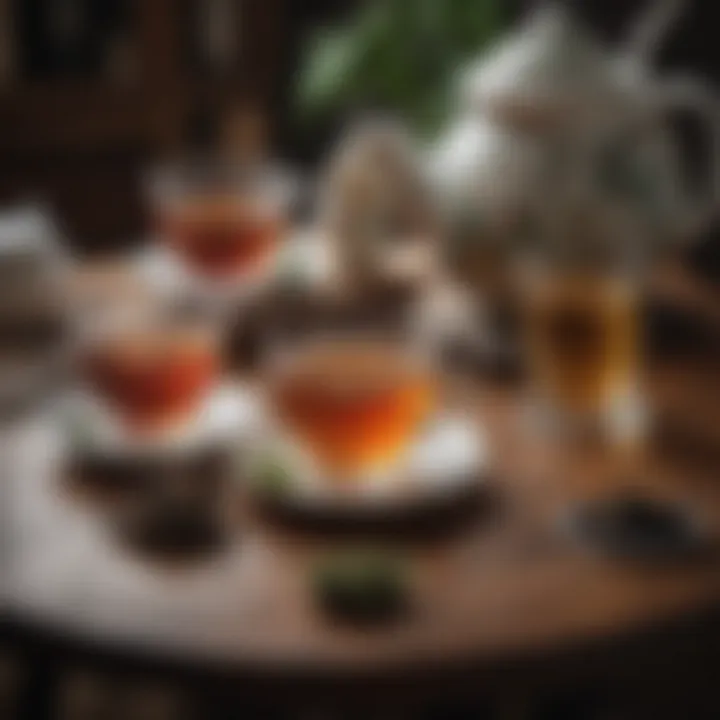Exploring Alcohol Infused Tea: A Comprehensive Guide


Intro
The fusion of alcohol and tea is an emerging trend that has captured the attention of food enthusiasts. This innovative beverage marries the delicate flavors of tea with the complexity of various alcoholic drinks, creating a unique tasting experience. With the rise of craft beverages and artisanal approaches, alcohol infused tea offers a versatility that appeals to those seeking new culinary experiences. This guide seeks to explore its origins, brewing methods, health implications, and the culinary applications of this intriguing fusion.
Recipe Overview
Introducing alcohol infused tea involves understanding the essence of both ingredients. Whether it is a cocktail or a simple brew, the combination of tea and alcohol brings forth flavors that are rich and inviting. Japan and China have historical practices tying alcohol into tea preparations, with ingredients that enhance flavor rather than dominate.
Dish Description
Alcohol infused tea isn’t just a novel drink; it can range from refreshing cocktails to comforting warm blends. Classic options might include Earl Grey tea with gin or jasmine tea spiked with sake, providing a subtle interplay of two worlds.
Cuisine Type
This beverage draws particularly from Asian cuisine, where tea has ancient roots. However, it is increasingly finding its place in Western mixology, showcasing creativity in modern culinary practices.
Ingredients List
To create alcohol infused tea, the selection of ingredients plays a crucial role. The following components are central to the preparation of these drinks:
- Tea: Choose your base. Options include black, green, herbal, or oolong. Each type offers distinct flavor profiles.
- Alcohol: Common choices include gin, vodka, rum, or sake.
- Sweeteners: Honey or simple syrup can enhance the drink.
- Flavors: Fresh herbs or fruits can elevate the infusion's aroma and taste.
Detailed Ingredients
- Black Tea: Known for its robust flavor.
- Green Tea: Offers a fresh and earthy taste.
- Earl Grey: Infused with bergamot for a citrusy note.
- Vodka: Neutral spirit that allows tea flavors to shine.
- Gin: Adds botanical notes that can complement tea.
- Honey: Natural sweetener with a unique taste.
Substitutions and Variations
- Instead of vodka, you can try using flavored spirits like peach schnapps.
- Herbal teas, such as chamomile or peppermint, can replace traditional tea for a caffeine-free option.
- For a sparkling twist, consider topping off your drink with sparkling water or club soda.
Alcohol infused tea is more than a drink; it's a cross-cultural exploration of flavor and community.
The intersection of tea and alcohol offers a rich tapestry of tastes, inviting even the most discerning palette to discover new combinations. As we further explore this guide, we'll unravel more recipes and pairing strategies, illuminating the culinary significance of this fascinating beverage.
Prelims to Alcohol Infused Tea
The fusion of tea and alcohol opens a unique dialogue between traditional beverages and modern trends. Alcohol infused tea is gaining popularity, merging the comforting aspects of tea with the boldness of various spirits. This innovation presents an opportunity to not just enjoy tea differently but also expand one’s palate.
Definition and Overview
Alcohol infused tea refers to any tea that has undergone a process of infusion with an alcoholic base. The results can range from subtly aromatic to richly flavored concoctions. This combination exploits the nuances of both tea and alcohol, allowing for a complex flavor profile. Typically, the tea is steeped with a specified spirit, thereby extracting flavors, aromas, and beneficial compounds from the leaves. Popular spirits for infusion include gin, vodka, rum, and whiskey.
The growing interest in this beverage not only speaks to the creativity of mixologists but also invites exploration for tea enthusiasts. The practice fosters an understanding of different varieties and how they interact with alcohol. Tasting notes can develop through careful selection of both the tea and the alcohol, leading to a rewarding sensory experience.
Historical Context
The concept of combining alcohol with various herbal infusions is not new. In fact, historical texts reveal that cultures have experimented with such combinations for centuries. In many Asian cultures, medicinal brews often included alcoholic elements intended to enhance flavors and purported benefits.
The modern trend began gaining traction in the early 21st century as specialty teahouses and bars started to incorporate these unique drinks into their menus. Bartenders began mixing traditional cocktails with infused teas, crafting unique recipes that captivated both herbal tea lovers and cocktail aficionados alike.
"Alcohol infused tea is not just a drink; it’s an experience that narrates flavor stories through every sip."
As the craft movement in spirits has flourished, so has the exploration of alcohol infused teas. Hence, this blend of cultures and creativity supports a growing body of work that emphasizes artisanal methods. By understanding the historical significance, we appreciate the complexity of tastes and the evolution of this beverage, setting the stage for further exploration of brewing methods and contemporary practices.
The Process of Infusion
The process of infusion stands as a pivotal element in the world of alcohol infused tea. This practice integrates the worlds of tea and alcoholic beverages, creating unique flavors and experiences. Each phase of infusion plays a critical role in determining the final profile of the drink. Understanding this process helps you craft beverages that not only taste exquisite but also reflect a blend of traditions and innovative techniques.
Selecting the Right Tea
Selecting the right tea is the first crucial step. Different types of tea can yield varying flavor profiles when infused with alcohol. For instance, robust black teas can withstand stronger alcohols like whiskey, while delicate green teas might harmonize better with lighter spirits like vodka. It is essential to consider the characteristics of the tea when making your selection. Think about the flavor notes you wish to highlight. Are you looking for floral, earthy, or smoky tones? Each selection will influence the overall taste, making it a significant decision in the infusion process.
Choosing an Alcohol Base


Choosing the right alcohol base is as important as selecting the tea. The base could be anything from gin to bourbon, each altering the infusion's flavor dynamic. When choosing, consider how the flavor of the alcohol will interact with the tea. For example, gin’s herbal notes can complement the grassy flavors of green tea, whereas a spiced rum might add a new layer of complexity to black tea. Pay attention to the alcohol's quality as well. Higher quality spirits often enhance the drinking experience, leading to a more refined flavor profile.
Infusion Techniques
Cold Infusion Method
Cold infusion is a gentle technique that allows flavors to meld slowly. It involves steeping tea in cold alcohol for several hours, usually overnight. This method is favored for its ability to extract delicate nuances without overwhelming bitterness. A key characteristic is the smoothness it imparts to the final drink, making it a popular choice for light teas. However, the extraction process is slower, potentially requiring more time and patience than other methods.
Hot Infusion Method
In contrast, hot infusion employs hot alcohol, often enhancing the interaction between tea and spirit. This method extracts flavors more rapidly, resulting in a bolder drink. A critical aspect of hot infusion is its versatility; it is suitable for a wide range of teas and alcohol pairings. However, care must be taken not to over-extract, which can lead to bitterness. This method works well when you need a quicker preparation time.
Blending and Marrying Flavors
Blending and marrying flavors is an art within the infusion process. It involves combining various types of tea with different alcohol bases to create distinct flavor profiles. This technique is essential for crafting signature drinks. By experimenting with ratios and flavors, you can achieve a unique concoction. However, achieving balance is crucial. Overly dominant flavors can clash, detracting from the intended experience. Thus, it is advisable to start with small amounts and adjust gradually based on taste.
Key Insight: The choice of tea and alcohol, combined with the infusion technique, ultimately defines the character of alcohol infused tea. Mindful selection and experimentation offer avenues for greater culinary creativity.
Flavor Profiles and Pairings
Understanding flavor profiles and pairings is crucial when creating alcohol infused tea. This section explores how different flavors interact and complement each other. A harmonious blend enhances the drinking experience and allows for creative expression. When done right, these pairings can elevate the simple act of sipping tea into a memorable culinary experience.
Understanding Flavor Compatibility
Flavor compatibility refers to the idea that some flavors work better together than others. It involves considering the primary tastes such as sweetness, bitterness, acidity, and umami. The goal is to create balance. Teas have their distinct flavor characteristics. For instance, herbal teas might offer floral or fruity notes, while black teas often have a robust and malty profile.
Knowing how these flavors interact with various alcohol bases is essential. Those who mismatch the profiles can end up with an unpalatable drink. Therefore, understanding compatibility aids in crafting drinks that are not only enjoyable but also sophisticated.
Common Pairings
Pairing alcohol and tea can lead to delightful combinations. Below are specific synergies that have gained popularity in the realm of alcohol infused tea.
Herbal Teas and Spirits
Herbal teas are often caffeine-free and loaded with various health benefits. They can be paired with spirits like gin or rum, enhancing their natural qualities. The aromatic and herbal notes of these teas add depth to the spirit.
For example, mint tea blended with a floral gin can create a refreshing concoction. The key characteristic of this pairing is its versatility; it can be enjoyed hot or cold.
However, caution is needed. Herbal teas can sometimes mask the flavor of the alcohol, which might lead to overwhelming sweetness. Balanceing the ratio is important to enjoy the full experience without one overpowering the other.
Green Teas and Vodka
Green tea has a fresh, grassy flavor that works well with vodka. Vodka's neutral profile allows the subtlety of the tea to shine. This pairing is becoming more common in modern mixology, providing a refreshing twist.
A beneficial aspect of this combination is its lightness, making it perfect for summer drinks. Furthermore, the antioxidant content of green tea may offer some health advantages.
On the downside, without careful consideration, the natural taste of tea can compromise the drink's overall profile. Over-infusing the green tea can also lead to bitterness, which competes with vodka's smoothness.
Black Teas and Whiskey
Black tea, recognized for its bold flavor and darkness, pairs well with whiskey, providing a warm and rich tasting experience. The robust characteristics of black tea complement the complexity of whiskey, creating a union that appeals to many.
A notable feature of this combination is its warmth, making it a preferred choice for colder months. This pairing can enrich the experience of sipping both beverages, often with notes of caramel or vanilla appearing in the blend.
However, there are potential challenges. The strength of black tea should be matched with an equally bold whiskey to maintain balance. If mismatched, one can overpower the other.
"The right combinations can lead to an elevated sensory experience, merging the worlds of tea and spirits harmoniously."
In summary, understanding flavor profiles and choosing the right pairings in alcohol infused tea can enhance the overall experience. Thoughtful combinations lead to delightful surprises and a deeper appreciation for both beverages.
Health Benefits of Alcohol Infused Tea


Alcohol infused tea presents a unique fusion that combines the attributes of two popular beverages. Understanding the health benefits of this combination is essential for anyone interested in this emerging trend. It allows individuals to explore how the integration of alcohol with tea can promote wellness while providing enjoyment. This section focuses on specific elements such as antioxidant properties, potential relaxation effects, and the importance of moderation in consuming these drinks.
Antioxidant Properties
Alcohol infused tea can be a source of antioxidants, which play a pivotal role in maintaining overall health. Tea, especially varieties like green and black tea, is rich in compounds known as polyphenols. These compounds help combat oxidative stress, which is linked to numerous health issues, including chronic diseases. When alcohol is added to tea, it can preserve these beneficial compounds while enhancing the drinking experience. For instance, combining green tea with a light gin could keep the antioxidants intact while introducing a new flavor dimension.
- Polyphenols in Tea: These are known for their ability to neutralize free radicals.
- Potential Health Benefits: Improved heart health and reduced inflammation.
Overall, the infusion results in a delightful drink that not only tastes good but may also provide health advantages.
Potential Relaxation Effects
Tea is often associated with calming properties due to its natural components, such as L-theanine, an amino acid found primarily in green tea. When combined with alcohol, this effect could be amplified. Moderate consumption of alcohol can lead to a state of relaxation, which, when paired with the soothing qualities of tea, creates a delightful experience.
Drinks like a hibiscus-infused rum tea or chamomile-infused vodka highlight how these beverages could work together to promote relaxation. However, it is key to note that while the initial effects can be pleasant, excessive intake may lead to the opposite outcomes.
Moderation and Health Considerations
While exploring alcohol infused tea, one must approach with caution. The combination can lead to misconceptions about alcohol consumption. It is important to acknowledge that more is not always better. Moderation is crucial in reaping any potential health benefits without encountering negative effects. Individuals should be aware of their personal limits and how their bodies respond when combining these two beverages.
- Recognizing Personal Limits: Understand how much alcohol can be infused without compromising health.
- Potential Risks:
- Excessive alcohol consumption can lead to negative health effects.
- Mixing alcohol with certain teas can enhance the effects of drowsiness or reduce alertness.
It is vital to enjoy alcohol infused tea mindfully, appreciating both its flavors and health implications. Practicing moderation ensures that this innovative drink can be part of a balanced lifestyle.
Cultural Significance and Trends
The cultural importance of alcohol infused tea can be seen across various regions and traditions. This blend of tea and alcohol is not merely a trend; it reflects a fusion of cultures and culinary arts. Originating from diverse practices around the world, these beverages have evolved to highlight the significance of tradition, community, and innovation in both social interactions and culinary experiences.
Global Perspectives
Alcohol infused tea is enjoyed worldwide, each culture adding its unique twist. For instance, in the East, tea has historically been an integral part of social gatherings. When introduced to alcohol, it creates a varied yet familiar experience. Asian countries like China and Japan infuse their traditional teas with spirits like rice wine or whiskey, enhancing flavors and creating a new dimension to ancient rituals.
In the West, this combination has gained popularity in urban settings. Here, tea-as-a-cocktail became a trend in bars and lounges, engaging younger demographics. This global exchange enhances understanding and appreciation of different cultures through shared experiences of drinking.
Contemporary Trends
Craft and Artisanal Variations
Craft and artisanal variations of alcohol infused tea illustrate a commitment to quality and creativity. Many small producers focus on sourcing high-grade teas and locally distilled spirits. This emphasis on quality ensures a better flavor profile and sustainable practices, appealing to consumers who value both taste and ethics in their choices.
Artisanal brands often experiment with unique blends. By introducing local fruits, herbs, or spices, they refresh traditional combinations. This is a beneficial aspect since consumers increasingly seek stories and authenticity behind the products they consume. These variations can be intriguing yet approachable, making them popular among seasoned tea drinkers and casual consumers.
However, the challenge remains in maintaining consistency in high-demand markets. Supply chain constraints and growing popularity may sometimes hinder these smaller operations.
Tea Cocktails in Mixology
Tea cocktails in mixology represent a further evolution of the alcohol tea trend. Here, bartenders incorporate tea into classic cocktails or even create entirely new recipes. This unique approach enhances drink complexity and visual appeal. It's a popular choice for mixing due to its versatility and the wide range of flavors available.
The use of tea offers a lighter alternative to traditional cocktail bases, appealing to health-conscious individuals. Furthermore, tea's aromatic components create a sensory experience beyond just taste. However, there are considerations regarding balance; the strength of alcohol must harmonize with the tea's flavors. If not done well, one can easily overpower the other.
Key Takeaway: Alcohol infused tea is not simply a passing fad; it encapsulates a merging of cultures and creative expression in beverages. As consumers continue to seek authentic experiences, understanding the cultural background and trends in this space is essential to appreciating its full value.
Responsible Consumption Practices
Responsible consumption practices are essential in enjoying alcohol infused tea, balancing the pleasures of innovative flavors with the need for health and safety. This section focuses on critical elements that ensure a safe and enjoyable experience when consuming these beverages.
Understanding Alcohol Content
The alcohol content in infused tea can vary significantly based on the type of alcohol used and the infusion process. Different spirits carry different alcohol by volume (ABV) percentages. For example, vodka generally ranges between 35-40% ABV, while whiskey can vary from 40-50% ABV.


When creating alcohol infused tea, it is crucial to measure and note the alcohol content carefully. This information allows individuals to make informed decisions regarding their intake. It is also helpful to communicate alcohol levels in cocktails, especially those served in social settings. By knowing the ABV, one can gauge the strength of their drink and adjust their consumption accordingly.
"Being aware of alcohol levels can prevent unintended overconsumption and promote a more pleasurable drinking experience."
Recognizing Personal Limits
Individual tolerance to alcohol differs widely, influenced by factors such as body weight, age, and overall health. It is important to recognize one's limits when consuming alcohol infused tea. Starting with a small amount can help assess personal sensitivity to alcohol's effects. Observing how one's body responds to the drink is essential for making sound choices.
Additionally, social environments may encourage excess consumption. Staying attuned to personal limits in such situations requires conscious effort. Listening to one's body signals is key. Perhaps you might feel lightheaded or unusually relaxed; these sensations can serve as indicators that it is time to stop or slow down.
Practicing responsible consumption not only enhances personal health but also helps cultivate a respectful atmosphere for others enjoying the drink around you.
Recipes for Alcohol Infused Tea
Recipes for alcohol infused tea plays an essential role in the exploration of this unique beverage. They provide practical applications of the infusion techniques discussed in earlier sections. By offering a variety of recipes, readers can experiment with different flavors and find their preferred pairings. Additionally, recipes highlight the versatility of alcohol infused tea and showcase its potential for culinary creativity. The joy of creating personalized beverages allows enthusiasts to enjoy this fusion while understanding its depth.
Classic Recipes
Spiked Chai Latte
Spiked Chai Latte is a delightful combination of traditional chai spices and the warmth of alcohol. Using black tea as the base, this recipe incorporates spices like cinnamon, cardamom, and ginger. The addition of rum or whiskey enhances the drink’s richness. This recipe is beneficial for those seeking warmth during cold evenings or simply a novel twist on classic chai.
A key characteristic of Spiked Chai Latte is its comforting aromatic profile. The unique feature of this drink lies in its rich spice blend, which can inspire experimentation with various alcohols. Some may prefer spiced rum for added warmth, while others might choose a whiskey with a smoother finish.
However, it is advisable to monitor alcohol levels in this recipe. While it can be easy to lose track of how much is added, balance is crucial.
Green Tea Mojito
Green Tea Mojito melds the refreshing qualities of a mojito with the antioxidant benefits of green tea. This recipe typically combines brewed green tea, fresh mint, lime juice, and a splash of vodka. It provides a refreshing alternative to the traditional mojito, appealing to a wide audience.
The key characteristic of Green Tea Mojito is its invigorating flavor and aromatic profile. The unique feature is the use of fresh mint, which helps elevate the drink's freshness. The lightness and lower alcohol content may make this beverage popular among light drinkers or those looking for a refreshing option during warm months.
That said, balancing the tea with the other ingredients is important for maintaining flavor integrity. Getting the ratios right can take some practice, but the result is worth it.
Seasonal Variations
Summer Peach Iced Tea
Summer Peach Iced Tea is a fruity and refreshing beverage. Using black tea as a base, it incorporates muddled peaches for natural sweetness. Pairing this with a splash of peach schnapps adds a delightful twist. This recipe is particularly beneficial in hot weather as a chilled drink, perfect for gatherings.
One of its key characteristics is the harmony between tea and fresh fruit. The unique feature of this iced tea is that it can be customized with different types of fruit. The advantage includes the ability to cater to personal preferences by adjusting sweetness or alcohol levels.
On the flip side, ensuring that the tea does not become bland during the infusion process is vital. Monitoring the steeping time can help achieve the best flavor balance.
Spiced Winter Mulled Tea
Spiced Winter Mulled Tea embraces the warming qualities of spices and heat. It blends black tea with spices like cloves, nutmeg, and cinnamon, combined with red wine or brandy. This recipe is particularly popular during winter months, enhancing the cozy atmosphere of cold evenings.
Its key characteristic is the rich, warming flavor profile, which offers a full-bodied experience. The unique feature of Spiced Winter Mulled Tea is the preparation method; the drink is heated, allowing flavors to meld together.
The advantage of this approach is that it creates an inviting ambiance for winter gatherings. However, care must be taken not to overheat the drink, which can lead to bitterness or loss of delicate flavors.
In summary, the recipes for alcohol infused tea provide diverse options for enjoyment, catering to various tastes and seasonal preferences. From warming chai lattes to refreshing mojitos, there is something for everyone.
End
The topic of alcohol infused tea holds significant importance in the culinary world. This exploration reveals how the combination of tea and alcohol extends beyond mere novelty. It invites enthusiasts to reconsider their beverage choices and encourages a deeper understanding of flavor profiles. By merging these two elements, a unique experience is born that appeals to both tea lovers and cocktail aficionados.
Reflections on Alcohol Infused Tea
Alcohol infused tea represents more than just a trend; it is a fusion of cultural practices and modern lifestyle choices. Many drinkers appreciate the richness of flavors that arise when one blends high-quality tea with various alcohol bases. Each infusion provides its own set of characteristics, adding complexity to drinks that could otherwise be mundane. Moreover, it offers a platform for creativity. Bartenders and home mixologists can experiment, leading to the birth of personalized concoctions that mirror their own preferences. The increase in craft and artisanal productions underscores a shift towards quality and authenticity in what we consume. This thoughtful approach to drinking reflects a growing interest in holistic and mindful consumption of beverages.
Future Prospects
The future for alcohol infused tea looks promising. As more people explore its potential, we can expect growth in various areas. One notable trend is the rising interest in sustainable and organic ingredients. Consumers are becoming more conscious of the sourcing and environmental impact of their choices. As a result, brands that prioritize these values will likely gain traction.
Additionally, the proliferation of tea cocktails in mixology suggests a potential for innovation. Happy hour can be redefined with unique offerings that highlight alcohol infused tea, appealing to both new and experienced drinkers. Moreover, education around this topic can be enhanced, providing workshops or classes that dive deeper into blending techniques and flavor pairing.







